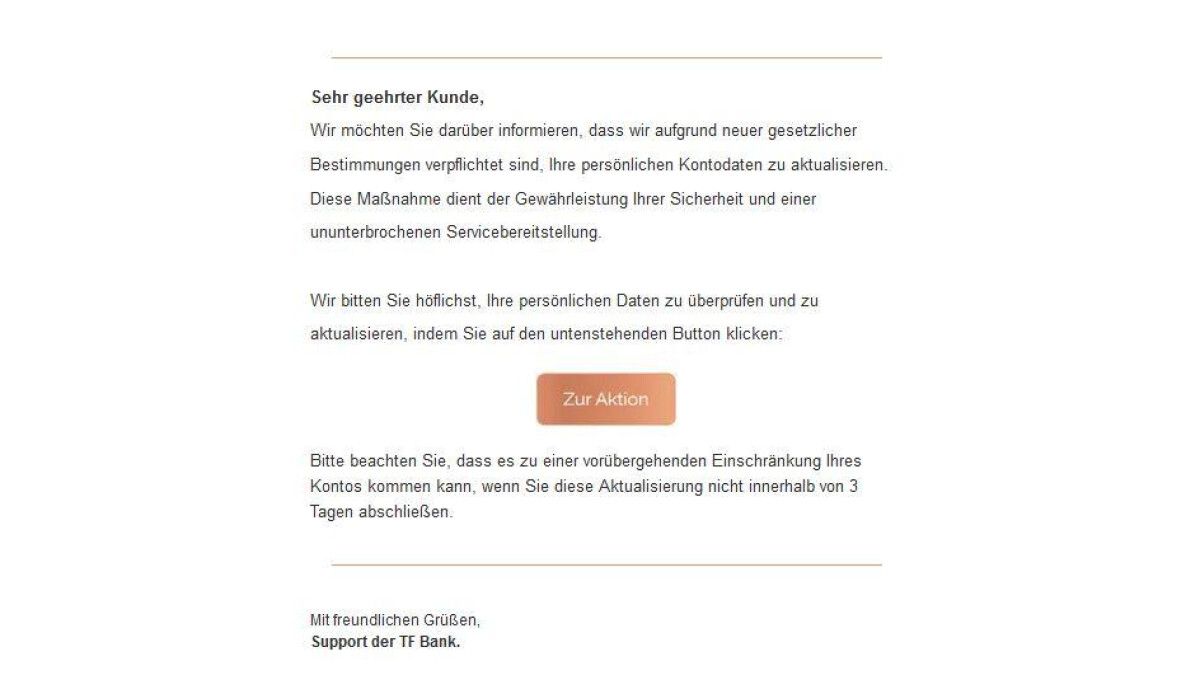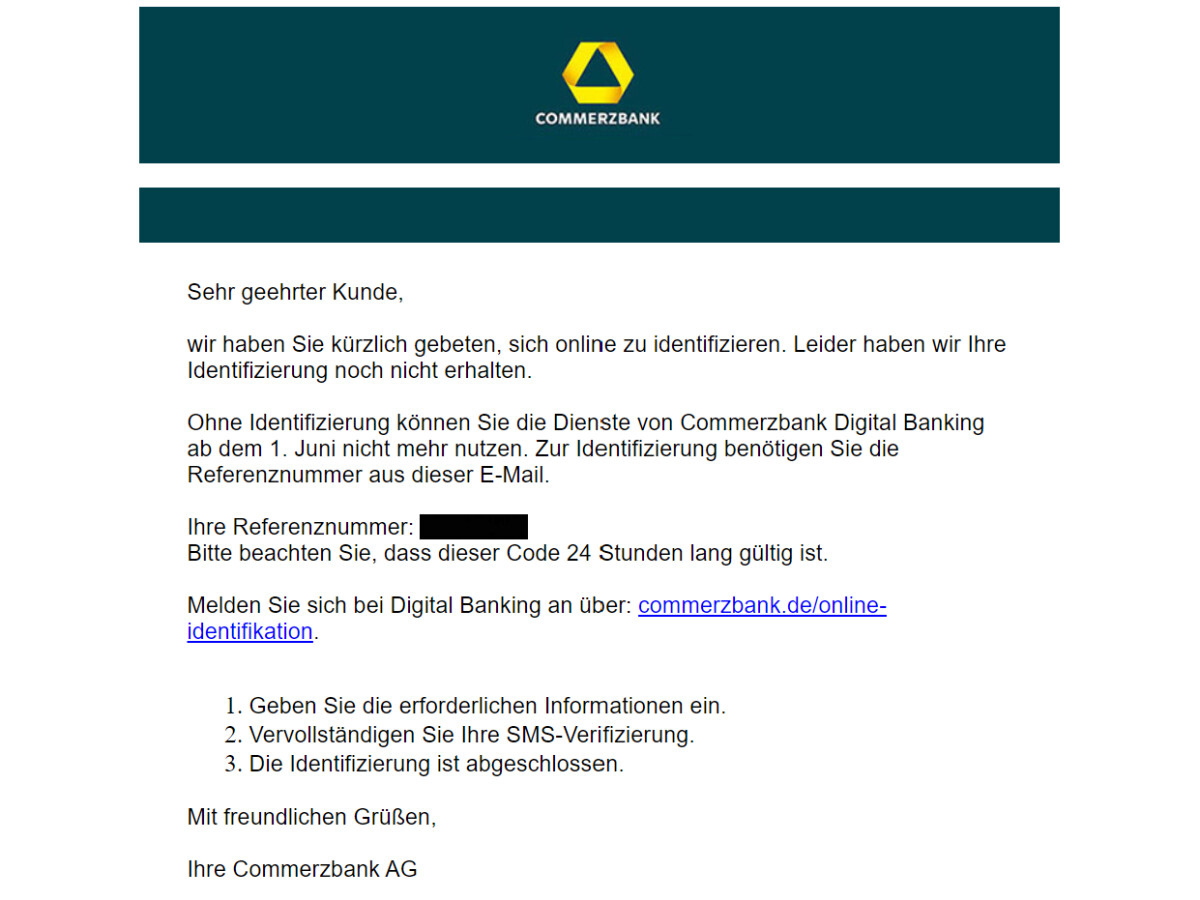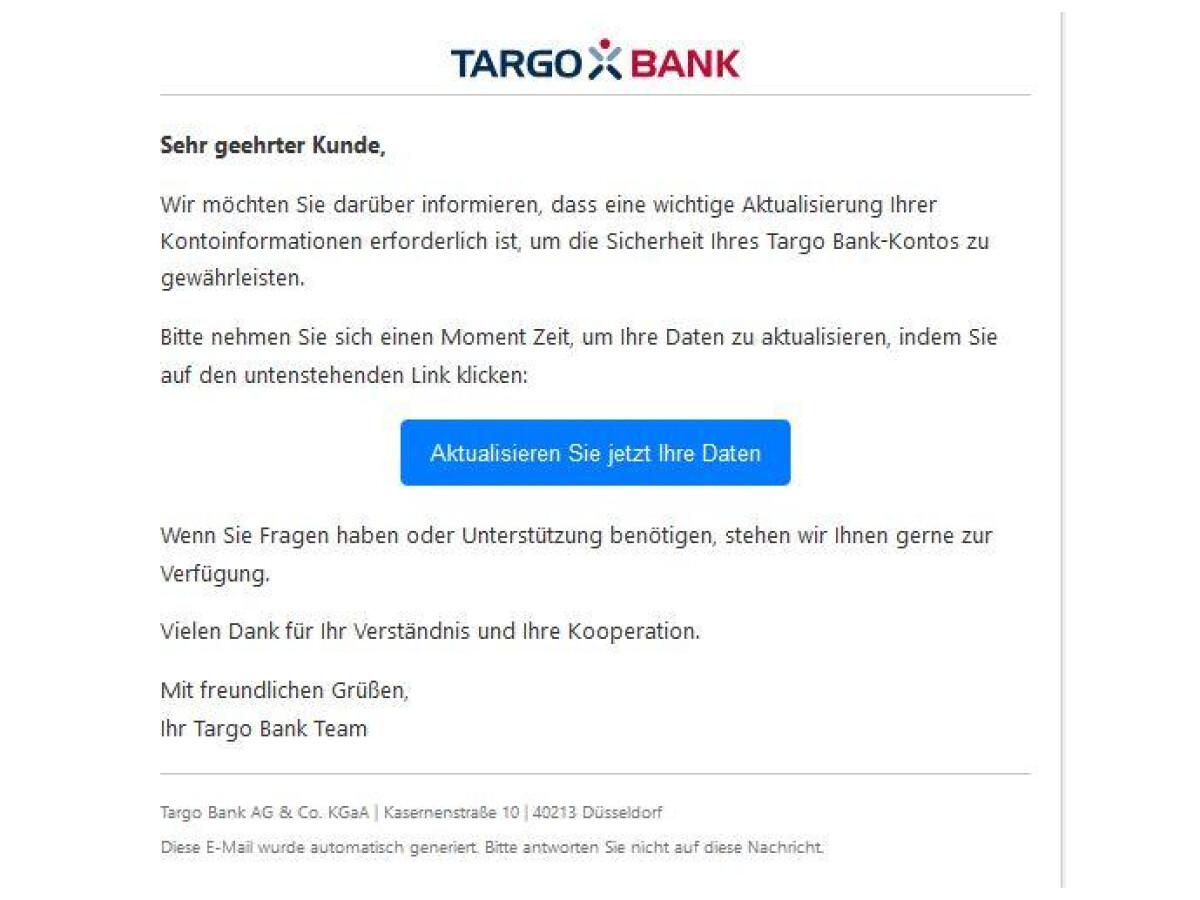Three banks are currently the target of a large-scale phishing attack. If you have an account with one of the affected banks, your savings are at risk.
If you fall for these phishing emails, the ATM will soon stop spitting out money. (Source: pixabay/ 3dam_eu)
Hard to detect fraud in the name of TF Bank
Identification at Commerzbank
Fraud in the name of Targo Bank
How to deal with phishing emails
Simple signs: How to recognize every phishing email
What do criminals achieve with phishing attacks?
Every day, a minefield of fraud attempts awaits you. Cyber criminals use a variety of methods to ensure that you fall into at least one trap. Be it a spam call that lures you with a fake prize, a WhatsApp clone that steals your passwords or the traditional phishing email. The latter is causing particularly big problems at the moment because the fraudsters want to use this scam to plunder the money from your bank account.
To do this, the criminals send emails in the name of well-known banks and try to get your personal data and payment information. Three banks are currently affected by the phishing wave, according to the consumer advice center. We will show you whether your bank is involved and how you can recognize the fraud attempt. This is the only way to avoid financial damage and the misuse of your data.
Hard to detect fraud in the name of TF Bank
In the first case, the scammers contact you on behalf of TF Bank. In the message, they claim that updating your personal account information is necessary due to new legal regulations. This process is purely for your security. The cybercriminals politely ask you to verify your data using the attached button.

The impersonal greeting is a clear sign of phishing. (Source: Consumer Advice Center)
With the threat that your account could be temporarily restricted if you do not complete the action within three days. Don’t let the deadline put you under pressure.
Although the impersonal greeting, request to disclose data and the threat clearly indicate a phishing attempt, the sender address can still be deceptive at first glance. It seems extremely authentic. TF Bank itself provides assistance in such serious cases on its official website.
Identification at Commerzbank
Commerzbank customers are also affected. In the phishing email with the “Start your online identification [Erinnerung]” it says that you were recently asked to identify yourself. Now comes the reminder with the information that you will no longer be able to use the Commerzbank Digital Banking services from June 1st if you do not complete the process.

Don’t let the deadline influence you. (Source: Consumer Advice Center)
A reference number is required for the process, but it is only valid for 24 hours. Here, too, the scammers want to put you under pressure and encourage you to act rashly. You are asked to register via a link, provide the necessary information and complete the process with an SMS verification.
Of course, you should not comply with this request if you value your money and your data. Not only the request for your data is a clear indication of an attempted fraud, but also the sender address, the impersonal greeting and the deadline.
Fraud in the name of Targo Bank
If you have an account with Targo Bank, you should take a closer look at your emails. If you come across the subject “Action required: Update your account information now,” you have an attempted fraud. Unsurprisingly, updating your data is used as a pretext for the theft.

Do not click on the link in this email. (Source: Consumer Advice Center)
A button labeled “Update your data now” takes you to the supposedly necessary process. This is of course not true. You can also recognize this fraud attempt by the dubious sender address and the impersonal greeting.
How to deal with phishing emails
In none of the cases described should you click on the link. It always leads to a phishing page that appears to belong to the bank in question. If you enter the requested data, it will be sent immediately to the fraudsters. This way they can easily gain access to your account and plunder it. Identity theft as a result cannot be ruled out either.
As soon as an email asks for a data comparison, you can be sure that it does not come from your bank. They would never ask you to disclose your data. We advise you to move the phishing emails to your spam folder. We tell you why you should not delete them in the linked article.
Simple signs: How to recognize every phishing email
A first indication that you have received a phishing email: You will be asked to confirm personal data or enter it on a website. This You should not comply with this demand under any circumstancesIn addition, criminals often use the official logos of the companies they are copying in their emails, but not official sender addresses.
If the sender seems suspicious to you, you should read the email twice. This will often help you find spelling mistakes or inconsistencies in German grammar. The attackers usually don’t write their emails themselves, but instead use automatically generated messages or translate known emails using a translation program. But why all the effort?
What do criminals achieve with phishing attacks?
Phishing is used on the Internet to collect real user data. Money can be made from this when email addresses, names and other information are sold for advertising purposes or passed on in criminal forums. With the data obtained, cyber criminals can also target future phishing attacks more precisely and their attacks become more effective.
Have you received a suspicious email?
Forward it to [email protected]
or follow us on:
Phishing Checklist
- ✔
Spelling mistake? - ✔
Sensitive data requested? - ✔
Official logos? - ✔
Unknown sender?
Attachments and links contained in malicious emails often introduce malware or viruses onto your computer. And don’t ignore suspicious emails. Forward them to the email address above and help us report future phishing attacks.
More fraud warnings on Netzwelt – Stay one step ahead of cyber criminals
But phishing emails are not the only danger lurking on the Internet. In addition to attempted fraud, there are all kinds of viruses, Trojans and malware that can infect your computer. Unfortunately, data scandals are also part of everyday digital life. You can see the latest articles on the topic of “fraud warnings” below:
Do you want to stay informed about the latest fraud reports, subscribe to netzwelt on TwitterFacebook and Instagram.
- ” Tip: The best VPN providers for more security and data protection
- » Buy a balcony power plant: Comparison of the best solar systems
Don’t miss anything with the NETWORK-Newsletter
Every Friday: The most informative and entertaining summary from the world of technology!
